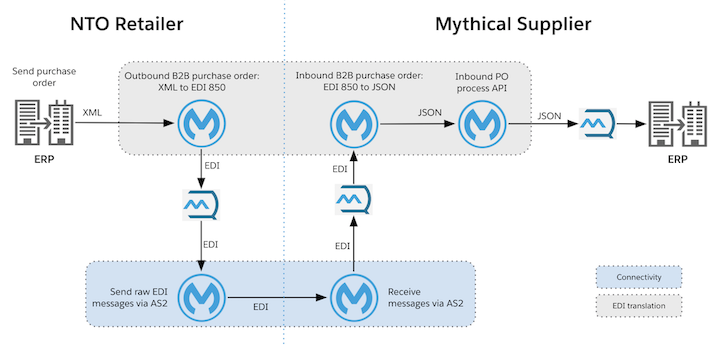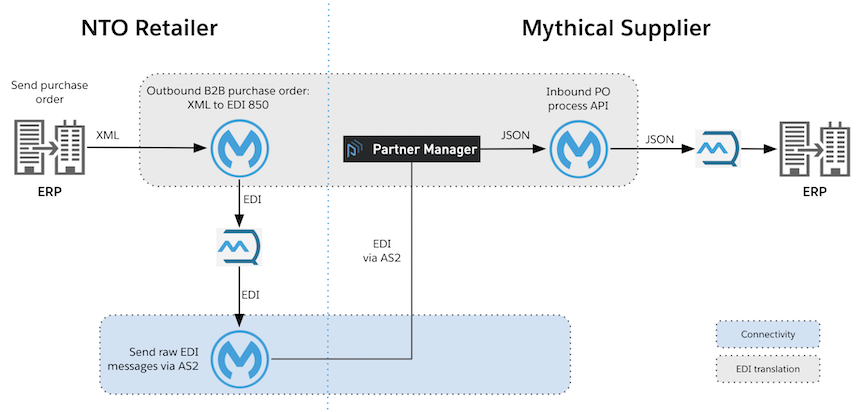In order to build a sustainable value chain, enterprises need to establish an ecosystem of businesses — partners, suppliers, manufacturers, shippers, etc. According to a Gartner research in 2020, an organization’s digital ecosystem is a dynamic network of entities (people, businesses, and things) interacting with each other through real-time integrated solutions to create and exchange sustainable value. Technology blurs boundaries between internal and external partners. To enable the execution of everyday supply chain processes in a digital ecosystem, supply chain leaders need to determine the role that digital technology plays and validate and manage partners’ physical and digital requirements. The first step for an enterprise towards this digitization is to build B2B integrations that modernize the communication between their ecosystem of business partners.
What is B2B integration?
B2B integrations enable standardized and automated exchange of critical business transactions between enterprises. A classic example would be that of a large retailer or manufacturer sending transactions, such as purchase orders to its suppliers and the suppliers sending back advance shipment notices or invoices for fulfilled orders.
How does B2B integration work?
Business integrations start with extracting information from a source application of one organization, and translating it into a data format that can be understood by an external business partner and transferring it to them via a transport protocol. Over the years, communication between organizations used a distinct mix of systems and protocols posing scalability challenges. In order to standardize the communication, numerous industries adopted EDI (electronic data interchange) as a standard to overcome interoperability challenges.
Standards and communication protocols
EDI has become a global standard for transmitting business transactions in numerous industries. EDI standards also provide a detailed set of guidelines and compliance rules for business transactions, driving greater levels of operational efficiency for businesses across different industries. ANSI ASC X12 and UN/EDIFACT are the two most popular EDI standards widely used in North America and Europe.
Beyond a message format, enterprise exchange business transactions should also agree on a standardized communication channel. FTP (File Transfer Protocol) evolved as a widely used transfer method to exchange EDI transactions since the 1970s, with SFTP emerging in the late 1990s offering a more secure way of exchanging transactions. AS2 (Applicability Statement 2) protocol came into existence in the early 2000s, offering a more secure and reliable way of exchanging B2B transactions over the internet.
Are traditional B2B integrations holding your company back?
While EDI remains the standard because of the robust reliability and security that it provides, over time EDI message standards have become frayed and effectively diluted the industry vision of providing scale in B2B interactions. Integrating B2B systems transmitting EDI messages into a point-to-point system, rather than a platform, organizations observed increasing fragility and complexity — creating more demands on central IT to maintain.
How can you modernize EDI and B2B integrations with API-led
Our approach to integration, API-led connectivity, allows organizations to unlock the value of existing systems with APIs and innovate rapidly without losing security or control of critical enterprise data. Using the power of API-led connectivity for EDI/B2B communications, organizations can tie together new SaaS and mobile applications with traditional B2B protocols and standards. This enables companies to build reusable services across multiple B2B trading partners and B2B processes on a single connectivity platform — increasing agility and decreasing time for partner onboarding, while reducing cost and risk.
Transforming B2B with Anypoint B2B Solutions
MuleSoft’s Anypoint Platform provides out-of-the-box support for widely used B2B transport protocols such as AS2, SFTP, and FTP along with capabilities to parse/create and validate EDI messages in X12 and EDIFACT formats. The platform enables customers to run their B2B integration workloads on the same unified platform alongside their enterprise integration services and APIs.
Anypoint Connectors for B2B
Anypoint B2B Solutions enable efficient ways of exchanging business transactions with your trading partners. The diagram below illustrates how a typical B2B message exchange can be built leveraging Anypoint B2B Connectors.
AS2 Connector
MuleSoft’s Drummond Group certified AS2 connector allows sending and receiving business transactions over secure and reliable AS2 transport protocol within Anypoint Platform. The Anypoint AS2 Connector supports a wide variety of signature and encryption algorithms, fully aligning with the AS2 standards specifications for interoperability and security. The connector also supports basic authentication in both send and receive operations.
Key use cases supported:
- Send AS2 messages to trading partners with synchronous MDNs.
- Send AS2 messages to trading partners with asynchronous MDNs.
- AS2 listener to receive AS2 messages from trading partners.
- MDN listener to receive asynchronous MDNs back from trading partners.
- Non-repudiation storage of signed AS2 messages and receipts.
Learn more about the Anypoint AS2 connector here.
X12 Connector
MuleSoft, a registered member of the X12 standards organization, provides out-of-the-box capabilities within Anypoint Platform through the X12 connector to parse/generate, validate, and transform EDI X12 messages fully aligning with the X12 Standard specifications for versions 3010 through 7050. The X12 connector also supports HIPAA versions 5010.
Key use cases supported:
- Transform enterprise messages such as purchase orders, invoices, advance ship notices from backend systems into X12 transactions and send to trading partners.
- Receive X12 transactions from trading partners, translate to enterprise message formats and integrate with backend systems.
- Apply validation rules to ensure compliance with X12 standard specifications.
- Customize schema specifications based on trading partner’s requirements.
- Automatic generation of X12 control numbers on outbound transactions.
Learn more about the Anypoint X12 connector here.
EDIFACT Connector
Anypoint EDIFACT Connector supports 41 versions of UN/EDIFACT standard specifications, providing out of the box support to parse/generate, validate, and transform EDIFACT messages.
Key use cases supported:
- Transform enterprise messages such as orders and invoices received from backend systems into EDIFACT messages and send to trading partners.
- Receive EDIFACT messages from trading partners, translate to enterprise message formats, and integrate with backend systems.
- Apply validation rules to ensure compliance with EDIFACT standard specifications.
- Customize schema specifications based on trading partner’s requirements.
- Automatic generation of EDIFACT control numbers on outbound messages.
Learn more about the Anypoint EDIFACT connector here.
Anypoint Partner Manager
MuleSoft’s Anypoint Partner Manager provides a simplified, configuration-driven B2B integration solution to manage B2B trading partner ecosystems with ease. With underlying technical and infrastructure complexities abstracted from end-users, Partner Manager offers a wizard-driven four-step configuration to manage the full lifecycle of trading partner onboarding from configurations, testing, deployment, and monitoring of B2B integration workflows. It enables organizations to onboard new trading partners quickly and drive better operational efficiency of the B2B data exchange.
Learn more about Anypoint Partner Manager here.
Bringing Anypoint B2B Solutions to life
We will now look at how you can leverage Anypoint B2B solutions to implement a real-world use case.
NTO is a leading retailer selling groceries and consumer goods with 1000s of stores across the country. Mythical Supplier manufactures and distributes consumer goods such as paper-towels, detergents, and personal-care products. NTO places 1000s of purchase orders with Mythical on a daily basis to stock the shelves of their retail stores with products their customers love. Mythical and NTO leverage the services of logistics carriers to transport freight between Mythical Supplier’s warehouses and NTO’s distribution centers and retail outlets. Thousands of B2B transactions get exchanged between NTO and Mythical to keep this supply chain running efficiently.
Implementation with Anypoint B2B Connectors
The diagram below shows a high-level overview of the use case enabling NTO Retailer to send EDI purchase orders (X12 850 transactions) to Mythical Supplier leveraging Anypoint connectors.
Implementing the use case involves two major steps, and we will elaborate them in the next set of blogs in this series:
- Establishing AS2 connectivity between NTO and Mythical
- X12 transformation processes at NTO Retailer (Outbound) and Mythical Supplier (Inbound) to integrate with the backend systems.
Implementation with Anypoint Partner Manager
The diagram below illustrates a high level overview of the use case enabling NTO Retailer to send EDI purchase orders (X12 850 transactions) to Mythical Supplier.
In this use case, NTO Retailer still continues using Anypoint B2B Connectors, but Mythical Supplier uses Anypoint Partner Manager to take advantage of several out-of-the-box features enabling them to scale their B2B integrations with their vast trading partner ecosystem at scale.
With Partner Manager, Mythical Supplier enables their:
- Line-of-business developers with an easy-to-use, configuration-driven, and low-code platform to onboard new trading partners quickly.
- B2B Operations team with an ability to view and manage B2B transactions activity to improve operational efficiency.
We will elaborate how Mythical Supplier leverages Partner Manager to receive and process inbound EDI purchase orders in a future post.
For more information on how to leverage both APIs and EDI together, check out the Anypoint Partner Manager webinar. Click here to try Anypoint Platform for free, and here to learn about a modern approach to B2B integrations leveraging API-led connectivity.













